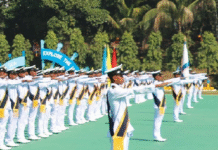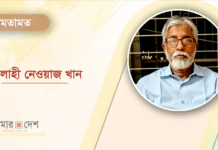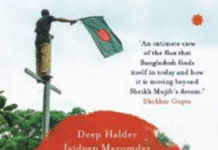Democracy reduced to elections: Arundhati
Talk held in city finally
Monwarul Islam | New Age Mar 05,2019

Writer and activist Arundhati Roy and photographer and activist Shahidul Alam raise their clenched fists symbolising determination to continue their fight for people’s rights at a talks at MIDAS Centre in Dhaka on Tuesday. — Abdullah Apu
Democracy has been reduced to elections in this part of the world, said eminent Indian writer and activist Arundhati Roy at a talk at MIDAS Centre in the Dhaka Tuesday evening.
She touched upon a number of issues ranging from politics through literature to culture in the session titled Utmost Everything, moderated by Chobi Mela director Shahidul Alam.
The talk by the author as a part of photography festival Chobi Mela 2019 was finally held at MIDAS Centre as Monday evening law enforcers allegedly forced the organisers to stop all preparations for the programme scheduled to be held at the Krishibid Institution Auditorium on security ground.
Chobi Mela organisers said that it became difficult for them to hold the talk even at the changed venueas the venue authority at the eleventh hour informed them that the organisers did not have police permission for the event.
They said that it was after 4:00pm when they were informed by the MIDAS authorities that they would be able to hold the programme at MIDAS Centre.
The talk was organised as part of the 10-day Chobi Mela X organised by Drik Picture Library Ltd and Pathshala South Asian Media Institute, kicked off on February 28 at several venues in the capital and scheduled to end on March 9.
‘Democracy in this part of the world has been reduced to elections and all institutions that are meant to constitute and empower democracy have been violated and penetrated by the powerful quarters,’ said Arundhati.
Referring to and reading from her political essay Democracy: Failing Light, she said, ‘Democracy, rather, has been narrowed to representative democracy where there is too much representation and too little democracy.’
The famous writer, who won the Man Booker Prize for Fiction in 1997 for her debut novel The God of Small Things, also observed, ‘In most places democracy has paired up with the free market economy to for a single predatory entity where nine people can own more wealth that that of 900 millions combined.’
In the session, full of pointy questions put by the moderator and precise answers by the writer, Arundhati also spoke of the ills that the state and the powerful do in the name of ‘development’.
‘Development or the economic growth has been the new mantra by which the state keeps making people’s lives difficult. It is good that people are now beginning to ask questions as to whose development the corporations or the politicians talk about,’ said Arundhati, who also criticised Indian government’s apathy to execute a proper water-sharing treaty with Bangladesh.
Though people are being jailed or tortured or even killed while questioning, ‘for whom the development is for’, or for even the slightest suggestions of redistributions of wealth, it is necessary that we question, continued Arundhati, who thinks that the nexus between the corporate and the powerful have been pushing the commoners’ good to the margin.
Under these ‘insidious circumstances’, artists should unite and raise their voices. ‘Though I believe that artists must disagree, argue and continuously push the limits, the time demands united voice for all of us,’ said Arundhati.
Drik director Rahnuma Ahmed said that police informed them Monday evening that their permission to hold the talks at Krishibid Institution Auditorium was withdrawn for ‘unavoidable circumstances’ and were forced to stop works of stage preparations.
Tejgaon police station officer-in-charge Mazharul Islam Kajal said that the organisers were asked to stop their scheduled programme for security reasons.









